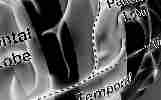Switch on Your Brain: The Key to Peak Happiness, Thinking, and Health (12 page)
Read Switch on Your Brain: The Key to Peak Happiness, Thinking, and Health Online
Authors: Dr. Caroline Leaf
Tags: #Health; Fitness & Dieting, #Christian Living, #Mental Health, #Christian Books & Bibles





HOW TO SWITCH ON YOUR BRAIN
The Seven Different Types of Thinking
Visual/Spatial
Musical
Kinesthetic
Logical/Mathematical
Intrapersonal
Linguistic
Interpersonal
The good news is that this balance can be restored very
quickly when you choose to become introspective and rumi-
nate in a positive, directed way.
14
The speed of the change in
how you feel and function is not just because of the balance
being restored between the DMN and TPN, but also be-
cause the brain functions in complex circuits that encompass
multiple brain structures and regions, so there is a positive,
cascading effect throughout the brain. This is, once again,
God’s grace in action.
Consequences of Toxic Thinking
Throughout this book, the resounding message is that nega-
tive thinking creates atypical responses in the brain, which
will result in atypical manifestations. Studies have clearly
demonstrated that people with a history of various types of
depression exhibit differences in the regions and circuits of
88
_Leaf_SwitchOnBrain_LS_mw.indd 88
5/16/13 1:33 PM
Entering into Directed Rest
the brain associated with knowledge of socially acceptable
behavior (anterior temporal lobe) and the awareness of wrong
(subgenual region of the brain).15
Their thoughts and the choices they have made changed
their brain in a negative way so that instead of being con-
victed of wrong in order to change—which is positive—they
felt guilty and condemned, causing the positive to become
negative.16
Other studies dealing with obsessive compulsive disorders17
and schizophrenia18 show definite changes in the brain from
the negative to the positive when thinking is brought under
control. Some scientists even describe these neuropsychiatric
manifestations almost as though negative, toxic thinking
opens a gate that allows negative emotions to overwhelm
them. And because mind changes matter, this negative think-
ing changes the brain structure.
Patients with schizophrenia have decreased activity be-
tween their thalamus and prefrontal cortex, which affects
memory and behavioral flexibility. They also have incorrect
activity in their decision-making and emotional areas of the
brain. From studies of adolescents starting to show symp-
toms of schizophrenia, it appears the areas are overactive at
first from toxic stress reactions and then become damaged
and hypoactive. So if we don’t help our children and adoles-
cents manage stress, we are potentially causing brain damage,
which in turn leads to more serious problems.19
Other research shows that women who have suffered abuse
were 60 percent more likely to have a child with autism. The
researchers propose that the long-lasting effects of abuse on
women’s biological systems, such as the immune system and
stress-response system, are responsible for increasing their
likelihood of having a child with autism.20 These women
89
_Leaf_SwitchOnBrain_LS_mw.indd 89
5/16/13 1:34 PM
HOW TO SWITCH ON YOUR BRAIN
were victims of toxic thinking and the stress it causes—and
the abuse will therefore impact the next generation as well,
and potentially the next three. This is why there are often
family histories of autism. I tell you this study to highlight
the responsibility we have in not only getting our own minds
right but also helping others, especially victims of trauma,
get their minds right.
Switch On Your Brain
Choosing to be focused and mindful and to activate your
DMN and your TPN in a balanced way by capturing your
thoughts will bring you back in alignment with God.
In my 21-Day Brain Detox Plan, I show you how to center
your attention on a single element, using my Switch On Your
Brain 5-Step Learning Process. When there is a pause in your
activity, a quiet state, that is a perfect time to connect to the
spiritual part of who you are. In this state your mind can begin
to understand what your spirit knows. You can position your-
self to let the Holy Spirit deposit truth and direction in your
spirit as you “trust in the Lord with all your heart, and lean
not on your own understanding; in all your ways acknowledge
Him, and He shall direct your paths” (Prov. 3:5–6).
Through modifying our practices of thought toward a
more disciplined, focused, and reflective thought life, we can
build up healthy neural
real estate
that is better able to bring
our thoughts into captivity and deal with the variegated de-
mands of today’s modern world. Your mind can powerfully
and unexpectedly change your brain in positive ways when
you intentionally direct your attention. The most efficient
way to improve your brain is a daily step-by-step process—
a lifestyle of thinking your brain into better functioning so
90
_Leaf_SwitchOnBrain_LS_mw.indd 90
5/16/13 1:34 PM
Entering into Directed Rest
that it turns into whatever
you
expect it to be: “As he thinks
in his heart, so is he” (Prov. 23:7).
Your mind, intellect, will, and emotions are always chang-
ing your brain in some way. Directed, disciplined, and focused
attention on the correct things is a major key to switching
on your brain.
1. We have all kinds of coordinated networks in our brains
that work together in an organized way, forming a con-
stant, intrinsic
chatter
in the nonconscious part of our
mind.
2. Our brains maintain a high level of activity 24/7. This
activity forms the brain’s inner life, with the default
mode network (DMN) dominating and becoming espe-
cially active when the mind is introspective and thinking
deeply in a directed rest or idle state.
3. As these networks function correctly, we shift into deeply
introspective and meditative states that increase our
intelligence and health.
4. When we switch back and forth between the various
networks—for example, when we have flexible and crea-
tive thinking—we are able to shift between thoughts
and capture and control them.
5. When we direct our rest by introspection, self-reflection,
and prayer; when we catch our thoughts; when we mem-
orize and quote Scripture; when we develop our mind
intellectually, we accelerate the default mode network
(DMN) and improve brain function as well as mind,
body, and spiritual health.
91
_Leaf_SwitchOnBrain_LS_mw.indd 91
5/16/13 1:34 PM
HOW TO SWITCH ON YOUR BRAIN
6. The DMN is balanced by the task positive network
(TPN), which supports the active thinking required
for making decisions. The more balanced we are, the
more wisdom we apply in our thinking and decisions.
This action step of the TPN is necessary for effective
mind and brain change.
7. Miswiring of brain regions involved in the DMN that
leads to all kinds of ups and downs in the DMN may
even be part of disorders ranging from Alzheimer’s to
schizophrenia.
8. Toxic thinking produces this miswiring, which causes
increased activity in the DMN, resulting in a decrease
of activity in the TPN. This causes maladaptive, depres-
sive ruminations and a decrease in the ability to solve
problems. This makes us feel foggy, confused, negative,
and depressed.
9. Your mind can powerfully and unexpectedly change
your brain in positive ways when you intentionally di-
rect your attention.
92
_Leaf_SwitchOnBrain_LS_mw.indd 92
5/16/13 1:34 PM
6
Stop Milkshake-Multitasking
Main Scripture: Dear friend, listen well to my words;
tune your ears to my voice. Keep my message in
plain view at all times. Concentrate! Learn it by
heart! Those who discover these words live, really
live; body and soul, they’re bursting with health.
Keep vigilant watch over your heart; that’s where
life starts. Proverbs 4:20–23 Message
Linked Science Concept: Multitasking is a persistent
myth. Paying deep, focused attention to one task
at a time is the correct way.
One of the plagues of modern existence is multi-
tasking, which leads to the further plagues of “hurry
sickness” and obsessive time management. The truth
about multitasking is that it is a persistent myth. What we
really do is shift our attention rapidly from task to task, result-
ing in two bad things: (1) We don’t devote as much focused
attention as we should to a specific activity, task, or piece of
93
_Leaf_SwitchOnBrain_LS_mw.indd 93
5/16/13 1:34 PM
HOW TO SWITCH ON YOUR BRAIN
information, and (2) we sacrifice the quality of our attention.
I call this “milkshake-multitasking.”
Multitasking Is a Persistent Myth
This poor focusing of attention and lack of quality in our
thought lives is the complete opposite of how the brain is
designed to function and causes a level of brain damage.
Every rapid, incomplete, and poor quality shift of thought
is like making a milkshake with your brain cells and neuro-
chemicals. This milkshake-multitasking, which is the truth
behind multitasking, creates patterns of flightiness and lack
